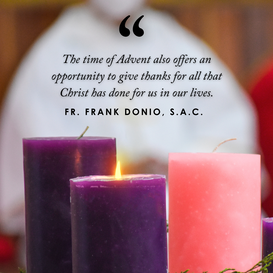 Many people do not like to wait. Western culture is instant. Waiting in line or waiting for something to arrive often creates impatience. The oft said line “patience is a virtue,” seems not to apply. We want whatever the thing is according to our schedule. God’s time, though, is not our time. We can be as impatient as we wish, but God will decide when the time is right. We need to decide if we are willing to wait, trust, and prepare. Christ is in our lives and wants to deepen his presence in us. Advent offers us a time to patiently wait for Christ who will come at the end of time and the one who is already incarnate among us which is what we celebrate at Christmas. The time of Advent also offers an opportunity to give thanks for all that Christ has done for us in our lives. It is a call to conversion of heart and deeper life in him. This is part of our preparation as we patiently wait. Conversion of heart may be a call to the Sacrament of Penance, so that we can receive the Eucharist in fuller love and openness. The Catholic Apostolate Center provides many resources for the Advent and Christmas seasons. We invite you to explore them and hope that they assist you in your preparation and waiting. For those in the United States, may you have a blessed Thanksgiving. For all, may you have a good and prayerful beginning to the Advent season. In God, the Infinite Love, Fr. Frank
0 Comments
“Death and life are in the power of the tongue, and those who love it will eat its fruit.” Proverbs 18:21. The definition of the word “communication” from Webster’s dictionary is: “to share or impart information.” I look at this word and see a whole lot more. Com = come and commune = to communicate intimately. Communication can be defined as people coming together intimately to share information of all kinds. Coming together or communing is a very personal act, requiring the openness of individuals to both share information as well as receive it. This is where the very act of communicating becomes challenging. We are diverse as individuals and have a multitude of ways of perceiving what is communicated, as well as varying ways of imparting our ideas and information. When we speak to another, we do not just simply use words. We use tone, inflection, and body language. Because of all this, we can relay information in a positive or a negative manner. Keeping this in mind, it is essential to be very intentional and aware of how and what we communicate at all times. Ephesians 4:24 is plain in its instruction: “Do not let any unwholesome talk come out of your mouths, but only what is helpful for building others up according to their needs, that it may benefit those who listen.” As Christians, we want to always strive to build up and encourage with our communication. I’ve found that for communication to be successful, there have to be some ground rules. This requires that we be intentional people of prayer who ask for wisdom and understanding. Praying also helps us to be reverent, respectful, and open. Colossians 4:6 tells us “Let your conversation be always full of grace, seasoned with salt, so that you may know how to answer everyone.” This is a tall order for mere humans, which is precisely why we need God working in and with us. Our words can be blessings or weapons in any of our relationships. God calls us to love Him and our neighbor as ourselves – to serve in humility and love. Our speech has to align with this, the greatest commandment. As Proverbs 12:18 says, “The words of the reckless pierce like swords, but the tongue of the wise brings healing.” What we say and how we deliver it reveals the spiritual battle we are engaged in. Our purpose in speaking should always be for the good of the recipient. There are so many things we wish to impart to others in our daily lives: instructions, encouragement, advice, exhortation, expressions of love, thanks, concern, correction. The list is endless. However, a quote attributed to St. Francis of Assisi sums up communication in a beautiful and profound way: “preach the Gospel always, and if necessary, use words.” What that means is that our goal should be to impart all that Jesus taught us through acts of love and mercy, and when we have exhausted our actions, then use words. I realize it is necessary to speak for many important reasons, but it must always be done in respect of the dignity of the recipient, aware that they are a child of God and always desiring the best for them. Since this is a challenging task, we must seek the help of the Holy Spirit and also holy people who can assist us in learning the best manner of speaking to others in all types of circumstances. It is not something we are just born with the ability to do. It comes with prayerful guidance and lots of practice. James 1:26 reminds us “Those who consider themselves religious and yet do not keep a tight rein on their tongues deceive themselves and their religion is worthless.” Another element of communication is discerning when it is appropriate to speak and when to remain silent. I don’t mean ignoring another or refusing to talk. I mean weighing what you ‘feel’ or ‘want’ to say versus what is ‘right’ and ‘necessary’ to impart. “The heart of the righteous weighs its answers, but the mouth of the wicked gushes evil,” Proverbs 15:28 continues. This requires each of us to spend a good amount of time in quiet prayer each day in order to be in an open disposition to receive wisdom and understanding about what to communicate. From there, we must pray for the grace to ‘commune’ with the recipient of our information in a loving and Godly manner. When we nurture a consistent prayer life with the Lord, we experience peace that guards our minds and hearts. Because of our woundedness and fallen nature, the world and the devil’s designs, we struggle in this area and need the guidance of the Holy Spirit to be communicators that build up, encourage, and love through our words. In our fractured world, when people are attacking each other on all fronts about every issue imaginable, we as Christians need to be conduits of peace when we communicate. Praying for the desire to express love in everything we do will benefit us when we communicate and when we are receiving communication from others. We must grow in self-control and patience so that our communication will be positive, even in the toughest conversations. As Christians working to build the Kingdom of God, we must allow the love of Christ to flow out of us in all our actions and in every word we utter. We can come together with others and share information in many beautiful ways. God gave us voices for this. Let us always be in deep communion with God who loved us into being and calls us to be relational in order to share His love and build His kingdom on earth! Let Psalm 141:3 be our daily prayer: “Set a guard over my mouth Lord, keep watch over the door of my lips.” To read more about charitable communication and evangelization, we invite you to read Choosing to Believe in Another’s Best Intentions or Communicating Like Chrysostom: Growing Your Skills in Speaking for the New Evangelization. Jesus gives us one of his greatest challenges in the Gospel for today. He says, “Stop judging and you will not be judged. Stop condemning and you will not be condemned. Forgive and you will be forgiven…For the measure with which you measure will in return be measured out to you.” (Lk. 6:27-28) While the last paragraph of this passage is the part that is most often quoted, the first two-thirds are just as challenging. In his words leading up to the well-known “judge not lest ye be judged,” the Lord calls us to be better than just taking the easy way out. Speaking to his disciples, Jesus said, “To you who hear I say, love your enemies, do good to those who hate you, bless those who curse you, pray for those who mistreat you. To the person who strikes you on one cheek, offer the other one as well, and from the person who takes your cloak, do not withhold even your tunic. Give to everyone who asks of you, and from the one who takes what is yours do not demand it back.” The key word is everyone.
He says, “For if you love those who love you, what credit is that to you? Even sinners love those who love them.” He reminds us that the easy way out won’t get us very far in the eyes of God. So you do good to those who do good to you? Even sinners do that. Think, Jesus constantly argued with the Pharisees who were quick to judge others but not themselves: “Why do your disciples pick grain on the sabbath? Why do you dine with sinners and tax collectors?” (emphasis added). Jesus’ response is this, “But rather, love your enemies and do good to them… then your reward will be great and you will be children of the Most High, for he himself is kind to the ungrateful and the wicked. Be merciful, just as also your Father is merciful.” To be merciful, to love even those who we find hardest to love, is to participate fully in the life of God who is merciful. We see Jesus’ command to not judge or condemn taken to extremes on either side. On the one hand, we can take this command to mean that we cannot correct or rebuke someone for their actions, even actions that are harmful to themselves or others. “Jesus said not to judge,” is often used as an excuse for the relativism that permeates our society. We can’t judge what someone else believes. In fact, to even suggest objective truth could be seen as condemnatory or judgmental and, therefore, we can’t do that. On the other hand, some will merely ignore Jesus’ words and condemn others as sinners, which we all are. If we ignore Jesus’ words, we risk putting ourselves on a pedestal, seeing ourselves as the good people and those other sinners as unclean and unworthy of my love and God’s love. In fact, Jesus is calling us to the middle ground. We believe in truth and that people can, in fact, be wrong. With patience and charity, we can judge an action to be right or wrong, but never in condemnation of the person—that judgement is God’s alone. Indeed, it is that understanding that God alone can judge a person’s heart that we must remember at all times, in all of our relationships and interactions. When we love others, friends and enemies, when we save condemnation and judgement of one’s heart for him alone who can do so (the Almighty God), then “For the measure with which you measure will in return be measured out to you.” Lord, Jesus Christ son of God, have mercy on me, a sinner. To learn more about our call to mercy, please click here. I believed the lie since I was small. I was only 10-years-old when my experience carved a wounding message into my heart: I would not be taken care of by anyone but myself. I was on my own. The lie ensnared me as my dad withered away. He was weak, fragile, and powerless, but it hadn’t always been that way. He had once stood like a great tree: strong, a protector who covered me with his mighty branches. By the time he was diagnosed, he had already begun to fade. I once climbed into his arms for safety, but he could no longer bear the weight of my tiny frame. When he passed, I, however unconsciously, decided that the only way to protect myself from the pain of being left alone was to choose independent solitude. “I’ve got it under control” became my most used phrase. If I refused the support and care offered to me, then I would not risk the pain of losing love when it inevitably let me down. Like a black hole, the lie swallowed me up and trapped me, even into adulthood. The birth of my first child was shadowed by the fear that he might be taken from me. Could I dare to love someone so fragile? Though my marriage is a gift of redemption, I still fought the discomfort of allowing another into the most intimate corners of my heart. I was hiding behind a thick wall of I-can-do-it-all-alone. Satan loves this wound. It is easily infected, and I was at constant risk of being overcome. The years I spent believing the lie are the same years I spent being invited to freedom in Christ by people who love me. Because of their care, I knew who He was and that He was good. I was only unsure that He was good to me. However, the years of isolation and masked strength wore me down. I was being crushed by the weight of loneliness, and I needed to be saved. So I surrendered. Carefully, I relaxed into the arms of Emmanuel. When I laid down my defense, I could see beyond the wall I had built. There was my God, and He was fighting an Enemy who cannot overcome Him. He saw me, invited me to lay my hurt at the Cross, and He cleansed me with Truth: I am the daughter of a Father who never leaves and never fails. I fight each day to remain in that Truth, remembering the ways He has fought for me and trusting that He will show up for me again. The wounding message I received is not gone, but I no longer carry it alone. I will not completely understand the role of the wounds I carry while on this side of Heaven, but I understand this: He knew that I would need to seek after Him for healing, and that when I did I would fall in love with the Healer. When I am tempted to turn away from the Lord out of my wrong belief that I stand alone, I am reminded that He designed me to depend upon His grace. As I entrust my fragile heart to God’s care, I receive His good from life’s bad. He offers better protection than the walls around my heart ever could. Romans 8:28 says, “We know that in all things God works for the good of those who love Him, who have been called according to His purpose.” Dear one, I invite you to surrender to Him. Allow him to fight for you. Get to know Him as you do. Be patient-- with God, and with yourself as He shows you how to accept love and care. The Father can and will produce goodness out of what you give Him. There is freedom in the healing. If you enjoyed this post, we invite you to read Participating in Our Own Redemption and Seeking Healing and Living in Right Relationship.
I watched her curly little head bounce away from me further down the hiking path and around a bend, out of my sight. I knew her older brothers would slow down so she could keep up with them, taking her under their wings. In the midst of a global pandemic, the woods were a safe space, open and free from the danger that seems to lurk everywhere these days. Nonetheless, my heart rate picked up along with my pace. What if a stranger was on the path? What if she fell and got hurt? I couldn’t see the path ahead, and I was afraid. I hurried along, my anxiety increasing as my steps forward failed to lead me to a view of my children. My thoughts turned dark while the woods around me became bright. Trapped in my own head, I failed to notice the sun breaking through, filtering light through the treetops. Until—there! The sunshine reflecting off of my little girl’s sequin covered sneakers allowed me to catch a glimpse of my babies. “Red light!” I yelled, in our family shorthand for “stop-moving-your-body-immediately.” The birds scattered, startled. My children froze in place as they waited for me to catch up with them. As I knew they would be, the boys were watching closely over their little sister. Taking her by the hand, they coached her through the mud and over the fallen branches. “See, Mama? Pretty!” my curly little girl exclaimed, joyfully depositing semi-crushed wildflowers into my hands. After rubbing her nose against mine, she joined her brothers on a moss-covered log, not registering my fear for even a moment. Exhaling a sigh of relief, I praised God in joy for great big brothers, my safe little girl, and a Father who is Light, illuminating the way. In this season of uncertainty, I find myself living that moment on the hiking path time and again: rushing forward, afraid, unable to see what is ahead. My days are filled with research and passionate conversation about schooling, and what the right choice for our family will be this fall. We deliberate over each barbecue invitation and mourn the loss of birthday celebrations that will never come to life. Parenting in a season where change is the only constant is overwhelming. I’m living that moment on the hiking path again: where I could not see, there was light. Though I was afraid, the Father was before me, protecting my little ones. So now, instead of remaining trapped by my thoughts, I am pursuing His power and protection. I am practicing seeking the light. In his letter to the Colossians, St. Paul reminds us that we can live in joy even in the midst of hardship, and he shows us how: “[We are] strengthened with every power, in accord with His glorious might, for all endurance and patience, with joy giving thanks to the Father who has made you fit to share in the inheritance of the saints in light. He delivered us from the power of darkness and transferred us to the kingdom[...]”(Colossians 1:11-12). Joy is a pursuit. By God’s great mercy, we are called out of the darkness and into the light. We are invited to share in the inheritance of the saints, if only we can pursue His power and glorious might instead of depending upon our own. When left to myself, I abandon joy for the hopelessness and despair that seems to permeate the world during this pandemic. However, when I pursue the heart of Christ, I am promised endurance and patience. I am equipped to face the reality of a sick and broken world and to remain unbroken by its weight. In His power alone, joy still abounds. Joy is a practice. Turning hands full of crushed wildflowers to praise comes with intentionality. So: let us train ourselves to joy. When we feel the dark closing in on us, we are called to joyfully give thanks to the Father and to seek His fingerprints that so graciously mark our lives—to acknowledge His many gifts. When the trees block our view, let us enjoy the sunshine filtering through their branches. When the path is rocky and unsure, let us acknowledge that He walks alongside us, and before us. When we suffer through sickness, hardship, and isolation, let us hope in God who has overcome suffering once and for all. This is joy. Grace-filled moments of contentment, happiness, peace, safety, and hope that we open our eyes to experience, even in the midst of the dark. Where happiness is fleeting and circumstantial, joy is ours to keep no matter the circumstance. Along this path I will stumble and fall. Joy will evade me as I am burdened by fear and uncertainty. But I will allow the Lord to raise me up, seeking the joy He offers me despite my skinned knees. Like my curly girl, I choose to trust that I am not alone. I choose wildflowers and light. I chase joy.
"…we constantly find the tension between what man is and what he would like to be; between that which has been realized and that which remains to be accomplished. And it is patience which endures this tension." -Romano Guardini, Learning the Virtues That Lead You to God, 1963, 39. It turns out I really am not a huge fan of working out. After retiring from professional soccer in 2018, I’ve found it quite difficult to motivate myself to exercise when it is not formally baked into my day and when I am not paid to do it. I like being fit, but not the effort and time it requires. There is another reason, however, that I do not like working out, which is: I am impatient. Rather than committing to a regular schedule and planning the workouts to be manageable in difficulty, I go sporadically and push myself to a near death experience. Every. Single. Time. Behind my mindset is a deeply embedded impatience with the process of becoming fit. I want the result without the process—which is not possible. I want to become fit through the course of one rigorous workout and overstep the gradual process that it takes to become a fit person. In sports there is the common—and helpful—phrase of “trust the process.” What this means in the sporting world is that there is a necessary process of development that every athlete must go through in order to become good or great at his or her sport. It means that no one can go from ‘beginner’ to ‘expert’ without passing through ‘proficient’. There is a development in sport—and life—lodged in the school of gradual growth rather than immediate transformation. This frustrates us. All of us have some idea of who we would like to be, which is then immediately confronted by the reality of who we are. What enables us to endure this gap between idea and reality is what we call patience. Patience is needed where there is a desire not yet fulfilled. Case and point—my workout saga. I want to be fit (idea) but am not (reality) and therefore need patience to trust the gradual process of becoming fit. Patience is the virtue needed to shorten the gap and become who I want to be. There is another phrase in athletics related to “trust the process,” which is, “love the process.” What this means is that the best thing an athlete can do on the road to athletic development is not only trust that skill is only developed over time with effort, but that coming to enjoy that slow and gradual development is an extremely beneficial thing. The great athletes do this. There’s a reason you hear so many stories of the best athletes, from all different sports, being the first at practice and the last to leave. They fall in love with the process of becoming better. Apart from a commitment to the process there is no greatness. We must come to trust and love the “process” of being made holy. When I came into the Church in 2015, I was on fire. I wanted to: be a priest (while I was engaged to be married), learn to pray the Rosary, read St. Faustina’s diary and St. Teresa of Avila’s autobiography, make a pilgrimage to Fatima, know the 2000+ year history of the Church, and learn Biblical Greek (all of these are true and I tried to do all of them with the exception of become a priest). I wanted to become a saint overnight. However, I didn’t quite realize that’s typically not how God works. He knows—because He made us—that if He sanctified us too quickly, we’d be tempted into thinking we are responsible. So, just like every natural thing on earth, our spiritual lives develop organically over time, with much difficulty, slow progress, victories and defeats, deaths and resurrections, all for the purpose of maturity. Sanctification—growing in holiness—is a process just like anything else that is real in this life. Character does not suddenly emerge, wisdom is not haphazardly acquired, and virtue is not cheaply gained. All of the things that pertain to our nature—that is what makes a person a person—come by way of the long, winding, and arduous road. We must come to love the road. Guardini points out that—in our spiritual lives—it is often patience with ourselves that is most needed. We see who we would like to be and the faults of who we are. There is a saint in the distance but a sinner in the mirror. All of this is a call to patience—not despair. “Patience with oneself…is the foundation of all progress,” says Guardini. The gap between who we are and who we would like to be is not so much a condemnation on ourselves but an invitation from God to dream bigger, to trust in His grace, and to patiently enjoy the journey. “He who wishes to advance must always begin again,” Guardini continues, and this takes strength. It is easy to float through life without ever attempting the effort necessary to gradually grow, or the effort to begin again, or the effort to examine oneself, or the effort to admit you desire more. The virtue of patience requires strength—an interior strength that can withstand the assault of failure on our ego. Strength to call things as they are. For “only the strong man can exercise living patience, can take upon himself again and again the things that are; only he can always begin anew.” This is a living patience—one capable of enduring “the process” with joy trusting in the direction of one’s life. Jesus, may we all trust in your grace over our efforts and patiently trust the process that is your grace working in us for our sanctification. Help us to learn to be content where we are, focus on what is in front of us, and be satisfied with small steps, realizing that small steps are a big deal. May we be granted the strength to endure our shortcomings in all things, but especially our spiritual lives. May we look to your goodness, mercy, and transformative love and trust that you are leading us—slowly, gently, and for our own good—exactly where we are meant to go.
The world has been immersed in this COVID-19 pandemic for several months now, and as we endure the troubles it causes I am inspired to pray more ardently for us all. This is new territory we are traversing. Some are working from home, some are furloughed from businesses that are temporarily closed, some are working on the front lines as first responders and healthcare professionals, some are children being schooled at home. Gatherings and events are postponed indefinitely. We are ordered to ‘shelter at home’ unless we need to seek medical help or purchase necessary household supplies. Our normal routines have been severely disrupted and we are stressed with the new responsibilities of performing our duties on the home-front. Families with children struggle to figure out distance learning and creative ways to incorporate recess and physical activity into their schedule. Adults are untangling the nuances of setting up home offices with all the technical details this entails. The elderly combat the loneliness of being shut in and away from interaction with their loved ones. Households with people working in healthcare or essential jobs attempt to grind out a safe coexistence with other members of their home. All of us endeavor to carve out a new schedule for our days in lock down. During this time that I am on leave from my work due to the shut-down, I am impelled to pray for the relationships of all those affected by this situation. I use an adaptation of 1 Corinthians 13 as a model to pray for those I am in house with: Be patient with __________________ Be kind to ___________________ Don’t be jealous of _________________ Don’t be boastful around ________________ Don’t be arrogant towards _________________ Don’t be rude with _____________________ Don’t insist on your own way with _________________ Don’t be irritable with ____________________ Don’t rejoice at wrong in ___________________ Rejoice at right in ___________________ Bear all that ____________________ presents to you Believe in ___________________ right heart Hope for the best in _____________________ Endure all for ____________________ When I pray these verses and insert the name of my husband and each of my children, my attitude of frustration is redirected, my heart softens to gentleness, and I am brought into God’s will for these relationships. This is important work we are called to engage in during this time. We are given the wonderful opportunity to embrace the grace of the Holy Spirit so that we may suffer well through this crisis. In the middle of turmoil and all sorts of troubles, we can choose to see the good that God can bring and live in the knowledge that we are not separated from His love. How beautiful that is to ponder! Romans 8:31-32, 35- 39 confidently professes to us all: “If God is for us, who can ever be against us? Since he did not spare even his own son but gave him up for us all, won’t he also give us everything else? Can anything ever separate us from Christ’s love? Does it mean he no longer loves us if we have trouble or calamity, or are persecuted, or hungry, or destitute, or in danger, or threatened with death? No, despite all these things, overwhelming victory is ours through Christ, who loved us. And I am convinced that nothing can ever separate us from God’s love. Neither death nor life, neither angels nor demons, neither our fears for today nor our worries about tomorrow – not even the powers of hell can separate us from God’s love. No power in the sky above or in the earth below – indeed, nothing in all creation will ever be able to separate us from the love of God that is revealed in Christ Jesus our Lord.” This promise stands firm and keeps me rooted in persevering in faith through great personal hardship. The distress of isolation, the difficulty in managing new routines, and the misery of being restricted from gathering with others are all huge trials for us. But we have an Almighty God who conquered a cruel death on the cross to allow us to enter into union with Him and His Father in heaven for all eternity. This reality draws me ever closer to Him in prayer and devotion. While I cannot gather with my parish family at the celebration of the holy Mass, I can connect with other priests all over the country as they livestream daily and Sunday Masses. Today I was afforded the occasion to sit with my husband and dog in our family room and enter into Mass at the Cathedral of St. Joseph with Bishop Donald DeGrood of Sioux Falls, South Dakota. It was a powerful feeling of connectedness to the greater Church family in another part of the country. We need only to search on our digital devices to find numerous ways we can connect as a Church and remain at a safe distance. So, let us go into this new day with enthusiasm and joy that God is with us through all things. May this be a fruitful time of growth in holiness as we welcome His grace to suffer well this trial. Although our churches are eerily silent and empty, our praise and worship cries out from our individual homes and binds us together. We are the Church!! “Create a pure heart in me, O God, and put a new and loyal spirit in me. Do not banish me from your presence, do not take your Holy Spirit away from me. Give me again the joy that comes from your salvation, and make me willing to obey you.” Psalm 51:10-12 Can you believe we are already in the fifth week of Lent? Personally, this year’s Lenten season has flown by for me. While I have not always held fast to the Lenten observances I chose for myself, I can already see the fruits of the changes I have been able to maintain. This year for Lent, I have begun working my way through the Bible using a program which breaks the Scriptures into easily-digestible daily segments from both the Old and New Testaments. Most of what I’ve read from the Old Testament so far has been very familiar to me—stories from creation to the great flood and Abraham and his successors. But what has struck me, as I’ve slowly progressed through the books of Genesis and Exodus, is the lack of trust that has plagued the human race since its creation. Reading these Bible passages has often left me pondering why mankind struggles so much to trust God. Adam and Eve fell for the serpent’s lies about the forbidden fruit instead of trusting that God knew what was good and appropriate for them; Abraham tried to jumpstart his promised line of innumerable progeny by having a child with his wife’s servant because his wife was supposedly incapable of bearing any children. Today’s first reading, from the Book of Numbers, continues these themes of distrust. “With their patience worn out by the journey,” the Israelites complain that they were rescued from slavery only to be left to die in the miserable desert, and that even the food the Lord has provided them is disgusting and wretched. I have found these particular stories from the Old Testament striking because they ring true for my own life; when I find myself in a difficult situation over which I have no control, I don’t always maintain my trust in God. I feel helpless because there is nothing I can do to change things, or I cannot fathom why things are unraveling in the way that they are. And, like hundreds of generations of the human race before me, I turn to the world first for answers instead of coming immediately to God. I usually end up complaining, and often times I prefer to question why He is treating me this way and do not trust that there is some good to come out of it that I cannot yet, and may not ever, see. In fact, I think this may be the heart of mankind’s trust issues: one of the hardest things for us to do is to have faith in God when we cannot see the whole picture, or do not understand what is going on, or cannot understand what God could possibly mean by calling us in the way that He does. But we do not need to see the whole picture in order to be faithful followers of Christ. We do not need to control the situation in order to get what God promised us. We can use our times of suffering, or times of feeling excluded from God’s plan, to bring ourselves closer to God. Instead of asking God why He has not done more for us, like the Israelites did in the desert, we can ask Him to show us what good our suffering could bring. And instead of trying to put ourselves on a more equal footing with God, like Adam and Eve or Abraham and Sarah did, we can ask God how best we can serve Him. Today, as we continue to navigate the incredibly difficult situations around us caused by the coronavirus, let us place our trust in God once more and turn to him in our time of need. I pray that this may be a fruitful time of growth in your relationship with God and that we may emerge from this time stronger in our faith, hope, and love. For more resources to accompany you during this time, please visit our Coronavirus Resource page. “Do not be troubled if you do not immediately receive from God what you ask him; for he desires to do something even greater for you, while you cling to him in prayer” -Evagrius Ponticus There are often times in our lives when God doesn’t seem to be answering our prayers. We pray repeatedly for certain people or intentions, sometimes for days, months—and even years—but our prayers seem to go unanswered. When nothing seems to be happening, it is easy to feel weary and disheartened. For the past several years, my husband and I have been praying for a specific situation that has only gotten more frustrating and bleak. At Mass during the first week of the Lenten season, I heard the words of Jesus to his disciples, “Ask and it will be given to you; seek and you will find; knock and the door will be opened to you” (emphasis added). After praying with this reading throughout the week, I heard the following words in my heart: “keep knocking.” I took this as a reminder to persevere in prayer. Whether or not we think God has answered our prayers does not change the fact of who he is: a good Father who knows what we need. Our intention to pray should not spring solely from the fact that we need something, but from our desire to strengthen our relationship with God and to be transformed and conformed to his will in the process. The Catechism summarizes it well when it says, “prayer is a battle” (2725). I’ve found this to be true on multiple fronts. First, it’s a battle to even set apart time to pray each day. It often seems that I don’t have time or that there are so many more important things to do. This year for Lent, I’ve decided to set apart the first 10-15 minutes of my children’s naptime for quiet prayer. This puts to practice a fact I already know intellectually: prayer gives my days purpose and meaning. Another opponent we fight in the battle of prayer is distraction. I often find that as soon as I commit to prayer time, my mind wanders or suddenly races with things to do. It’s normal to experience distraction in prayer. When this happens, simply bring yourself back to the present and don’t give the distraction too much attention. Other times, my prayer life seems dry and dull. It feels hard to pray and I don’t even have words to say. Additionally, we can experience something that might be the hardest of all: seeming silence in response to our prayers. The Catechism extrapolates, “Our battle has to confront what we experience as failure in prayer: discouragement during periods of dryness…disappointment over not being heard according to our own will…To overcome these obstacles, we must battle to gain humility, trust, and perseverance” (2728). Anything of merit is proven in times of hardship: our commitment to marriage, our love for our family, our life of faith, our dedication to a cause or ideal. We are unable to excel in an endeavor if we’ve never practiced. That is why my husband jokes that he will never pray for patience, because he doesn’t want to be presented with opportunities that will invite him to grow in that particular virtue. The Catechism speaks on this as well, “Filial trust is tested - it proves itself - in tribulation” (2734). Occasionally, we might not receive an answer to prayer immediately because the repeated action of prayer will make us grow in some way: in charity, in perseverance, in faith. The Catechism goes on to ask, “Are we asking God for ‘what is good for us?’ Our Father knows what we need before we ask him, but he awaits our petition because the dignity of his children lies in their freedom. We must pray, then, with his Spirit of freedom, to be able truly to know what he wants.” (2736) Perhaps we are praying for something that is not good for us. Or, even more likely, for something that is not best for us. Our prayers may be pure, well-intentioned, and holy, but may only partially supply what we, or the people we’re praying for, need. We often can only see part of the whole picture; our ways are not God’s ways. An example of this can be found in the story of St. Monica, who prayed for her son, Augustine, for 17 years before he was baptized and entered into the Catholic Church. In the midst of her prayers for the conversion of her son, Augustine snuck out of her care and escaped to follow his worldly pursuits in Rome. At the time, this was devastating to Monica, who only saw his continued descent into a life of sin. But it was in Rome that St. Augustine met St. Ambrose—the spirit-filled bishop who was a major catalyst in Augustine’s conversion. This example shows a good prayer that was seemingly unanswered. God did not seem to be “listening” to Monica’s pleas for her son to stay with her. Instead, he used a hopeless situation to bring about an even more powerful encounter that led to Augustine’s salvation. God never fails to hear our prayers. Said again, our prayers are always heard. By praying for something repeatedly, we grow in our charity for others, in our perseverance, and in our faith. St. Augustine himself reminds us of this, “God wills that our desire should be exercised in prayer, that we may be able to receive what he is prepared to give.” The more difficult prayer is not to pray for what we want or think we want, but to pray for God’s will to be done, as Jesus teaches us in the Garden of Gethsemane. The goal of prayer is a deepened relationship with and the love of God. We need prayer because we need God. Prayer is meant to change and transform us to be more like Christ, who lived in complete unity with the will of His Father. As the Catechism reminds us, “Against our dullness and laziness, the battle of prayer is that of humble, trusting, and persevering love” (2742). As we continue to grow in our understanding and practice of prayer this Lent, I invite you to persevere in the “battle” in order to say with Christ, “not as I will, but as you will.” For more resources on Prayer, please click here. 12/19/2019 Look Up, Set Out, and Give: Learning from Mary, the Magi, and the Shepherds this Advent SeasonRead Now“The Virgin today brings into the world the Eternal / And the earth offers a cave to the Inaccessible. / The angels and shepherds praise him / And the magi advance with the star, / For you are born for us, Little Child, God eternal!” (CCC525) The quote from the Catechism above references three key players I want to reflect upon at the beginning of this Advent season: Our Lady, the magi, and the shepherds. Today, as we think about the meaning of waiting and watching, upon preparing for Christmas and for the return of the Lord, we can look to these three examples to show us how to look up, set out, and give. First: It’s important to start off with an understanding of Advent as a liturgical time of waiting and preparation. I’ve often heard that God has three responses to our prayers: yes, no, or wait—wait being our least favorite of the three. “Wait” seems so indefinite. With a yes or no response, you know, for better or worse, one way or another, what your parameters are. But “wait” requires faith, trust, humility. It requires not knowing exactly when, exactly how, or exactly if. And that’s one lesson this season can impart: waiting well, waiting in hope. During Advent, we recall the waiting of the world for the birth of the Messiah. The greatest gift from God the Father, the gift of his Son, is coming to us. And in this world which has experienced his coming, we also wait for him to come again. Each of us awaits something. Perhaps we await a promotion. The completion of a degree. Maybe we long for a spouse or a child. Physical or emotional healing. The answer to our vocational discernment. In this time of waiting, we are like the Israelites wandering in the desert in pursuit of the Promised Land. It’s there--the Promised Land is there. God is faithful and keeps his promises. But sometimes, we have to wait. Waiting practically forces us to surrender control and hand everything over to God. It’s a daily practice in humility and faith. It acknowledges that we are not in control and challenges us to trust in the goodness of the One who is. Therefore, waiting has a purpose, an end: God Himself. And, as with the Israelites in the desert sustained by the descent of manna from heaven, we are fed daily by God himself IF we allow ourselves to be. This means speaking and listening to God in prayer. It means collecting the manna from above, his grace, DAILY. And this brings us to our first point about the Advent season: we need to look up and see. Mary knew what it meant to look up in prayer. She was so receptive to the word of God that she conceived it through the power of the Holy Spirit. She was looking up in prayer when the Angel Gabriel announced the Good News of the Messiah. Her response? “Let it be done unto me according to your word.” These were the words of trust, surrender, and peace--followed by action—the second of our themes today. She looked up and set out in order to give. Immediately after the Annunciation, we read about her going out to help her cousin Elizabeth. As someone who has experienced the first trimester of pregnancy twice now, I can tell you the last thing I’m thinking about during that time is helping or serving others. I’m usually passed out somewhere trying not to drool. But Mary has looked up, set out, and given. She was so receptive to God’s word that she was able to fully encounter his message through the Angel Gabriel. Her reception of Christ caused her to set out in haste to see Elizabeth. And finally, to give and serve another by bringing Christ into that home and modeling sacrificial love. Mary is the perfect example of waiting and being guided by God. In Scripture, she is described as “pondering things in her heart”—waiting for God to reveal his will and meditating on his work throughout her life. But she is not one who sits on the sideline and fails to engage. She is a contemplative in action—one who treasures the word of God within her (even literally) and yet immediately goes out to Elizabeth in her time of need. Mary brings Jesus to others, from the moment of his conception, wherever she goes and instructs us to “do whatever he tells you,” as at the wedding feast in Cana. We turn to Mary during this season of Advent because she is an expert at faithful waiting that leads to Christ. So I invite you as we continue our Advent journey to start by spending time with the Blessed Virgin Mary. Re-read the account of the Annunciation and Visitation in Scripture. Ask her help in waiting—faithfully, hopefully, humbly. And invite her to accompany, guide, and prepare you to receive Christ. She always leads others to her Son. In addition to the example of Mary, the magi can also teach us what it means to wait in hopeful anticipation: to look up and see the star, To set out, To give freely. The magi, though Gentiles, were not complacent, but so observant that they were able to recognize God’s sign: the star. As Pope Francis said, “The Magi were not content with just getting by, with keeping afloat. They understood that to truly live, we need a lofty goal and we need to keep looking up.” What keeps us this Advent from looking up and seeing the star? Are we busy scrolling through our social media feeds, binging on the latest Netflix series, working late hours at the office, or anxious about the future? Are we paralyzed by grief, bitterness, anger or fear? The magi were vigilant, ready to go when the time came. And their hearts were receptive, disposed to the signs of the times. Like Mary, they too set out on a journey which would lead them to Christ himself. This journey required effort, planning, and sacrifice. They looked up, set out, and finally, they gave: bearing costly gifts of gold, frankincense, and myrrh. They met the generosity of God by reciprocating generosity. As Pope Francis has also noted, “To give freely, for the Lord’s sake, without expecting anything in return: this is the sure sign that we have found Jesus.” Finally, we can also look to the example of the shepherds. Pope Francis says, “They were the first because they were among the last, the outcast. And they were the first because they were awake, keeping watch in the night, guarding their flocks.” The shepherds were looking up. After receiving the good news from the angel of the Lord, they go in haste to encounter Christ. And afterwards, they return glorifying and praising God. In each of these examples, we encounter people who are looking up, setting out, and giving. Mary sets out and gives her time and energy to serve her cousin Elizabeth. The magi set out and give gifts of gold, frankincense, and myrrh. The shepherds set out and give Christ their adoration and praise. Will we keep watch in the night alongside the shepherds or are we asleep with the rest of crowded Bethlehem, too distracted by our daily lives and concerns to notice the light of the star beaming down on the light of the world? As we await God’s response in our lives, do we grumble in the desert like the Israelites? Do we take things into our own hands and craft a golden calf? Or do we say to the Lord, “Let it be done unto me according to your word?” This season, will we set out in haste to give our hearts to the Lord and our hands to serve those in need? Perhaps what’s holding us back from entering into the Advent season is something more than distraction, ignorance, or noise. We may hesitate to meet this Christ-child because we feel as the shepherds most likely did, utterly unworthy. We wear the rags of sin, the stench of humanity. Maybe we feel like the little drummer boy in the popular song who says, “I have no gift to bring that’s fit to give a king.” In his humility, the Lord entered into the most vulnerable of human states: infancy. He chose to become little in order to demonstrate that all are able and invited to approach him. As Pope Francis also reminds us, “Jesus allows himself to be found by those who seek him, but to find him we need to get up and go.” So let’s get up and go. There is still time to look for the star, to set out, to give. I invite you to draw close to Mary, look to the example of the magi, spend time with the shepherds. In looking for Christ, encountering him, and serving others, we find Christ born also in our hearts. Only then, as the Catechism says, “when Christ is formed in us will the mystery of Christmas be fulfilled” (CCC526). Let us pray, “I want to come to Bethlehem, Lord, because there you await me. I want to realize that you, lying in a manger, are the bread of my life. I need the tender fragrance of your love so that I, in turn, can be bread broken for the world. Take me upon your shoulders, Good Shepherd; loved by you, I will be able to love my brothers and sisters and to take them by the hand. Then it will be Christmas, when I can say to you: “Lord you know everything; you know that I love you” (cf. Jn 21:17)." -Pope Francis There’s a lot of preparation that goes into the holiday season. It seems in our secular society as soon as the calendar changes to November that the world begins buzzing with cooking, baking, buying, wrapping, and planning. Our calendars overflow with gatherings and obligations and before we know it, it’s a new year. As Catholics, we know that this time of year tells a different story. However, the loud hubbub of secular holiday cheer swirling around us can make it difficult to proclaim it, even to ourselves. What would it look like in our daily lives over these next few weeks if we as Catholics challenged ourselves, in this season of frenzied preparation, to prepare ourselves to wait? What might that look like? Here are a few steps that we can take. OBSERVE We cannot decipher what steps to take if we do not spend the time observing where our current steps are leading. Take some time over these next few weeks to observe your spiritual and physical life. Make note of the areas of your life that you feel you are consistently inviting the Holy Spirit to be a part of and those areas in which He has not received an invitation. Notice the time of day or week that anger, frustration, hurt, or anxiety creep into your heart and mind. Where are your moments of joy, praise, and thanksgiving? How are you caring for your physical body and its environment? Observe how you are fueling your body and your mind. Is the source and substance of that nourishment strengthening your body and mind to be the best version of yourself? Are you spending moments in joyful movement, whatever that may look like for your body, in praise and thanksgiving of the vessel that is fearfully and wonderfully made? Simply take time to observe and collect information on your current state. Try not to put a label or judgment on your observation, but rather work to build your awareness. REFLECT Once you have collected your observations, spend some time reflecting on this newfound information and present it at the foot of the Cross. Implore the Holy Trinity to open your eyes and your heart to reveal to you the areas in your life that could be improved or strengthened. Ask for divine intervention to reveal to you the strengths that you possess and the gifts and talents that have been given to you. How might you utilize these strengths, gifts, and talents to bring life and light to those areas of your life that may be lacking? Be patient in your reflection. Do not be afraid of silence! It is often within the quiet of silence that He will make His presence known to you. Allow this prayerful, reflective time to turn your observational information into knowledge. ACT It’s time to turn that knowledge into a plan. Through your observation and reflection, you will have gathered the necessary tools to be able to move forward in your journey. Carry the strengths that have been revealed to you and humbly face the shortcomings that you have observed. What does action look like for your journey? What steps are required to strengthen areas of your spiritual and physical life that may be lacking? Put your plan into practice and remain vigilant and prayerful of the different ways that you can tweak your plan. WAIT We have spent the remaining weeks of the liturgical year in observation, reflection, and action… and now we wait. As you enter into the Church’s new year and the season of Advent, commit to the action plan you have created and joyfully await the celebration of the birth of YOUR Savior. If you’ve put the work into the first three steps, you will find that your action plan is in fact leading you to prepare for the tiny babe wrapped in swaddling clothes. “For a child is born to us, a son is given us; upon his shoulder dominion rests. They name him Wonder-Counselor, God-Hero, Father-Forever, Prince of Peace.” (Isaiah 9:5) Prepare to wait. Prepare the way. Prepare the place and invite Him to take residence in you – body, mind, and soul. For more resources to accompany you during this Advent season, please click here. “We Christians are called upon to preserve and spread the joy of waiting: we await God Who loves us infinitely and at the same time we are awaited by Him.” – Pope Francis
Over many years, I have been honored to accompany others in their vocation discernment and growth in faith through spiritual direction. Often, as is the case now, it is with young adults – undergraduate and graduate students, seminarians, and those beginning their work careers. In almost every instance, they try to prepare themselves well for the Lenten season, but rarely think about preparing for the Advent season. For many, the end of an academic semester as well as the gatherings, travel, and shopping for Thanksgiving and Christmas tend to leave little time to focus on Advent preparation and living. May I invite you, as I do them, to enter well into the waiting of Advent? It is meant to be a quiet time of deeper reflection on the coming of the Messiah, not just the first coming (the Incarnation) that we celebrate at Christmas, but the second coming of Christ at the end of time. The candles of the Advent wreath will be lit one after the other and the time will go by quickly. May we not let it not slip by, but use it well as a time of prayer, reflection, discernment, and deepening our encounter with Christ, through ongoing conversion of heart! May the Charity of Christ urge us on! For more resources to accompany you during the Advent season, please click here. My own faith journey has been greatly influenced by the Augustinians – a religious order of friars, joined by seculars and friends, who follow the Rule of St. Augustine. Simply put, Augustine’s Rule invites men and women to “be of one mind and heart on the way to God… [to be] travelers on pilgrimage together, wherein Christ is our constant companion, as well as our way and our goal.” St. Augustine of Hippo is one of the best-known saints in the Catholic Church. Although he was born in the 4th Century, his writings—like Confessions and The City of God—continue to inspire spiritual seekers to this day. For his contributions in theology, Augustine is also considered a Doctor of the Church. Beyond these accolades, Augustine’s personal character and self-proclaimed “restlessness for God” have inspired numerous men and women to take up his search for truth. One of these people is St. Nicholas of Tolentine, whose feast we celebrated on September 10th. Growing up in an Augustinian parish in Staten Island, NY, I knew there were at least a few saints from the Augustinian family, including: Augustine’s mother, St. Monica; St. Rita of Cascia; St. Thomas of Villanova (there’s a basketball-loving university named after him!); and St. Clare of Montefalco. I also knew of a church in the Bronx named St. Nicholas of Tolentine, but I must admit, I knew very little about him. A few years after college, and after some time away from my family parish, I found myself in a state of constant restlessness and spiritual doubt. Desiring a change, I reconnected with my past by joining the Augustinian Volunteers, a year-long volunteer program in which I traveled across the country, lived in intentional community, and learned about the greater Augustinian family. This experience confirmed a special place in my heart for the Augustinian saints, and I have been pleased to learn more about this man Nicholas who “sought for God by means of a deep interior life… [and] the practical love of neighbor.” According to a brief biography, Nicholas “was a simple priest and Augustinian friar who touched the lives of many.” Born to a poor family in Italy in the year 1245, Nicholas became an Augustinian friar at an early age (likely 16 or 18) after being inspired by another Augustinian preacher in his hometown. The Augustinian history states Nicholas was “full of charity towards his brother Augustinians as well as towards the people to whom he ministered. He visited the sick and cared for the needy. He was a noted preacher of the Gospel. He gave special attention to those who had fallen away from the Church. People considered him a miracle worker.” Nicholas fasted often and received visions during his lifetime, including that of angels repeating “to Tolentino,” where he moved and worked for the remainder of his life. In the tradition of Augustinian hospitality, Nicholas is said to have been over-generous in his duties feeding the poor at his monastery; so much so that his superiors asked him to hold back a bit. Nicholas (like many medieval saints) is linked through legend to miraculous incidents involving food. Once after weakening himself through prayer and fasting, he had visions of The Blessed Virgin and St. Augustine imploring him to eat some bread marked with a cross and dipped in water. This bread immediately regenerated his strength, and he went on to give the same bread to the ill while invoking Mary – thus beginning the Augustinian custom of distributing Saint Nicholas Bread. Another legend, perhaps inspired by contemporary Franciscan values and love of animals, tells of Nicholas vowing not to eat meat the rest of his life. When served a roasted fowl, Nicholas prayed and the bird returned to life, flying away from the table. Nicholas died on Sept. 30, 1305, and was canonized by Pope Eugene IV (also an Augustinian) in 1446. He was the first Augustinian to be canonized. At this ceremony, Nicholas was credited with about three hundred miracles. St. Nicholas is typically depicted in the black Augustinian habit, often with embroidered stars or a sun emblazoned on his chest, which seems to point to the great quote from his inspiration, St. Augustine: “Men go abroad to wonder at the heights of mountains, at the huge waves of the sea, at the long courses of the rivers, at the vast compass of the ocean, at the circular motions of the stars, and they pass by themselves without wondering.” In these days in which so many of us are searching for answers, let us pause to remember a kind saint who encouraged patience and prayer as ways of knowing and being. To learn more about faith-based service, please click here. No one ever told me that marriage prep would be easy, but as I soon discovered, it involves sacrifice, time management, communication, honesty, and humility. It demands both patience and inconvenience, and perhaps an uncomfortable truth or two. There's work to be done, yes, but this cannot compare to the countless joys and the excitement I share with my beloved. Preparation for marriage, however, does not conclude with the certificate of participation. The work continues and never stops! Our efforts may not be recorded by the diocese but are a natural part of this holy vocation. That afternoon, my fiancée and I were thankful for the work and sharing that was accomplished that day, but even more so for the time afterwards we had in order to further share, process, and discuss the details of our sacramental future together.
While this time of year may call to mind Valentine’s Day, the bishops of the United States have designated the observances of National Marriage Week (February 7-14) and World Marriage Day (Sunday, February 11) as “opportunities to focus on building a culture of life and love that begins with supporting and promoting marriage and the family.” The Church is invited to reflect on the role of marriage in the world and its influence on each of us, no matter our state in life. Of course, no two marriages are the same—a truth that reflects the beauty and depth of the sacrament and this mystery of love. Growing up, my parents were my first heroes. Their marriage was inspiring for a number of reasons, but I simply admired its endurance. Marriage, as they knew—and I am continuing to learn—is a lifelong commitment in the sight of God to offer the gift of self to one another in love and for the building of the domestic church, the family. Those called to marriage are entrusted with the awesome responsibility to answer God’s first command to humanity: be fruitful and multiply (Gaudium et spes 48). I was born out of my parent’s married love to bear witness to Love itself. Like my parents, my love is imperfect, yet I continue to offer it as they do: in order to sustain their marriage and continue to live out their vows to love each other in all circumstances of life. Seeing their efforts inspires and shapes my own for my future marriage. Thankfully, I can look not only to my parents’ example, but also to a number of saintly married couples whose lives of holiness are models for the rest of us. The heroic virtues that they exemplified through their marital love are a great source of encouragement and hope to those who face similar circumstances in their lives. My favorite is St. Gianna Molla and her husband, Pietro, who throughout their journey of love composed many beautiful letters to each other. In an increasingly secularized world where marriage is little more than cohabitation, holy couples such as the Mollas are refreshing witnesses to the sanctity of marriage and family life. They model for us the surrendering of all difficulties and hardships to God. Though marriage has its challenges and responsibilities, let us not be intimidated by the reality of this vocation! As in all the other sacraments, God’s grace flows throughout married life and sustains us through this calling. Yes, there are demands and difficulties, but these serve to purify our love in the example of Christ’s total and perfect love from the cross. As Pope Francis advised 10,000 engaged couples four years ago: We are all aware that the perfect family does not exist, nor does the perfect husband, nor the perfect wife. We exist, and we are sinners. Jesus, who knows us well, teaches us a secret: never let a day go by without asking forgiveness, or without restoring peace in your home. If we learn to apologize and forgive each other, the marriage will last. May the Holy Family pray for us as we continue to build the domestic church! For more resources on Marriage and Family, click here. Questions for Reflection: Can you think of examples in your own life of a married couple who lives out their vocation with joy? How has their witness impacted your understanding of marriage? “Practice patience toward everyone and especially toward yourself. Never be disturbed because of your imperfections but always get up bravely after a fall.” -St. Francis de Sales A few years ago, I had the opportunity to travel to Rome, Italy. To this day, the pilgrimage showers graces into my life. One day on the pilgrimage, we went to the Basilica of Sant’Agostino and prayed in front of a painting by Caravaggio called the Madonna di Loreto. In it, Caravaggio paints dirty, unkempt pilgrims kneeling in front of Our Lady and Jesus. Two years later, the image is still embedded in my mind. The Rome pilgrimage seemed to be a small microcosm of my life. My struggles and weaknesses were the same struggles and weaknesses I encountered back at home and work, yet in Rome they had a different weight. My frustrations with my weaknesses were still there, but it wasn’t until I was looking up at that painting that I realized that the pilgrimage was a process. My sin and weakness, my toil, my striving for sanctity—all of this was a process. The walking, the waiting, the impatience, the stumbling, the praying, the joy, the suffering—all was part of my pilgrimage and contributed to the end or goal: sanctity. I found myself praying for patience, and was informed by a fellow pilgrim that the root word of patience is “to suffer.” I found this definition fitting for the journey. Today, we are all on a pilgrimage aimed toward Heaven. In my walk, I find myself quickly frustrated at my stumbles, my repeated sin (that for some reason I just cannot get over), my judgment, my lack of love, and the list could go on. This frustration with the pace of my walk on the pilgrimage to salvation is not helpful for the walk—it is inhibiting. My walk requires patience with others and with myself. Looking at that painting by Caravaggio, I realized that we are the pilgrims—dirty from the journey, imperfect, on our knees asking Our Lady for the gift of her Son. He receives all of us as we are on this walk, and patience in the process will lend to an easier recovery after a stumble, a lighter load to carry. Let us grant ourselves patience throughout our pilgrimage to our end, Jesus Christ. As St. Teresa of Calcutta reminds us, “We have only today. Let us begin.” |
Details
Archives
July 2024
Categories
All
|
About |
Media |
© COPYRIGHT 2024 | ALL RIGHTS RESERVED

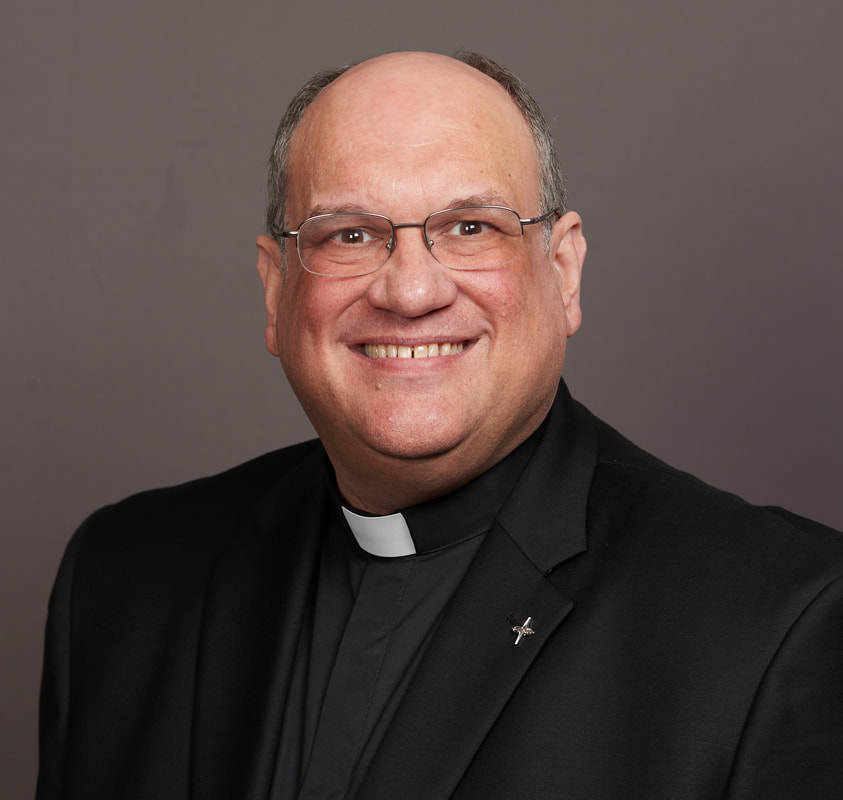



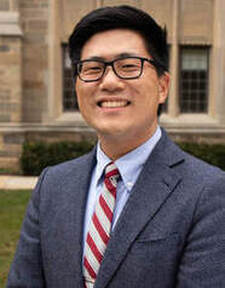
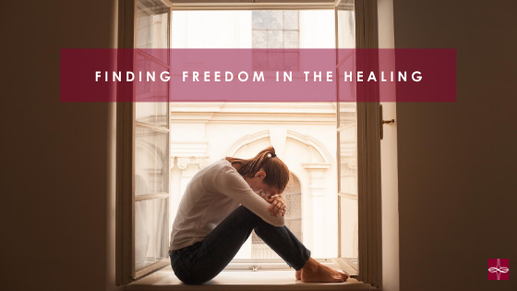



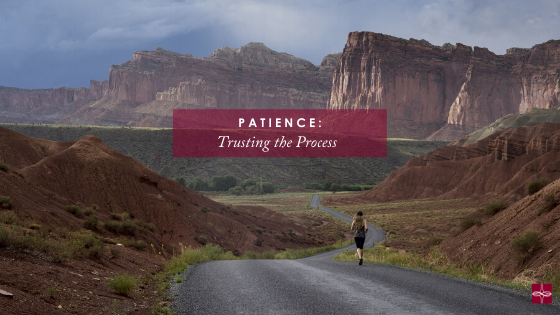





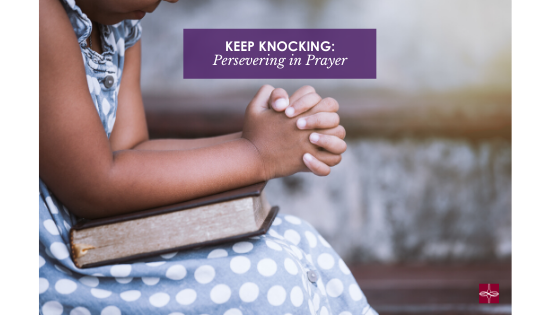

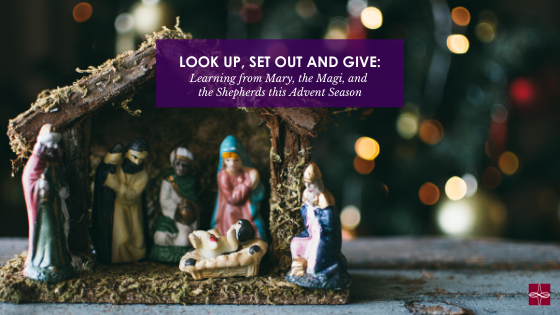


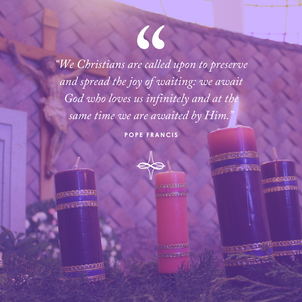
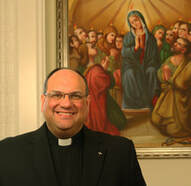
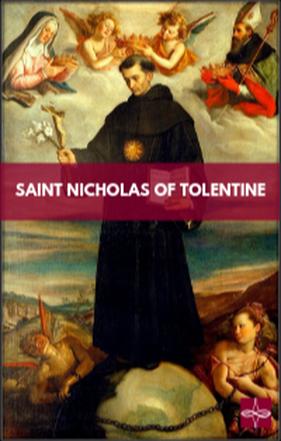

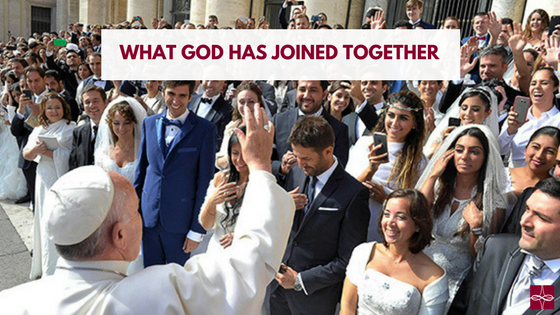

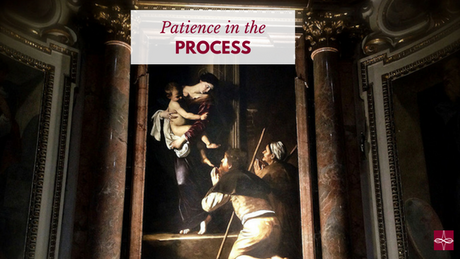

 RSS Feed
RSS Feed